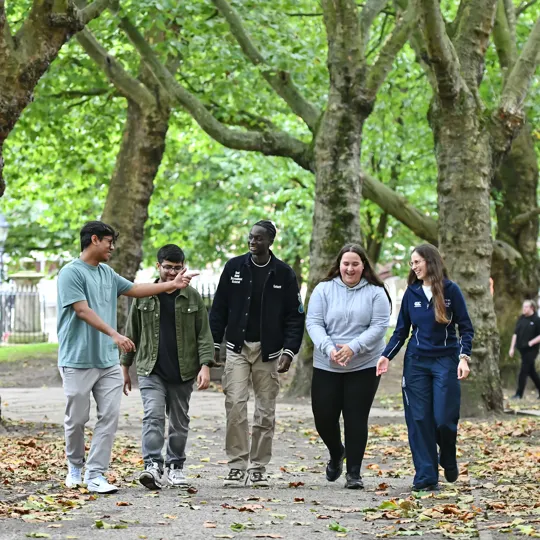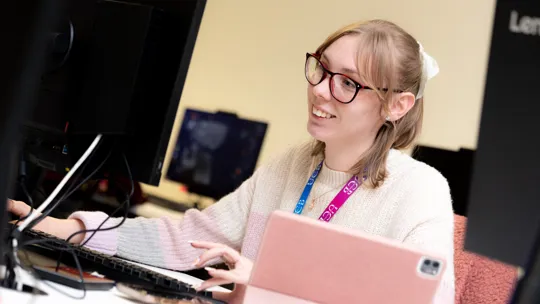September 2024
University further strengthens student support by joining mental health charter
By Sean Madden
Share post:Read time: approx 4 mins
University College Birmingham has joined 160 higher education institutions in signing up to the University Mental Health Charter Programme (UMHC).
Created by mental health charity Student Minds, it is an annual, membership-based programme, representing important progress in strengthening mental health and wellbeing support within the UK Higher Education Institution (HEI) sector.
Designed to support universities as they work towards a whole university approach to mental health, it aims to embed lasting cultural change, and help institutions become places that promote the mental health and wellbeing of all members of their communities.


As a member, University College Birmingham has access to a range of resources, including in-person and online events such as Communities of Practice and Journey Reviews, and training courses designed to improve knowledge and awareness of mental health and wellbeing issues.
These include ‘Train the Trainer’ courses such as ‘Look After Your Mate’, ‘Mental Health in Sport’, ‘Mental Health in Student Accommodation’, and ‘Wellbeing Skills for Student Leaders’.
University students can also access the Student Space website, developed in conjunction with university staff, clinicians, researchers, and students.
This complements the services offered by the University itself, providing students with advice and information, award-winning support services and a directory of options available through the University.
The University also has the opportunity to work towards the UMHC Award. This assessment comprehensively evaluates a university’s integration of the UMHC’s Principles of Good Practice, providing expert feedback by independent peer assessors including clinicians, students and higher education professionals. This seeks to drive continuous improvements in mental health support for both staff and students, and is augmented with regular award workshops.

“We know that making the transition to university can be difficult and overwhelming for many students, so we want them to receive the most comprehensive support in order to give them the best possible experience.”
“University College Birmingham are thrilled to have signed up for UMHC membership, and by combining our own award-winning support services with the resources of Student Minds, we are highlighting our continued commitment to the mental health and wellbeing of all our staff and students.”
Francesca Coleman, Head of Programmes at Student Minds, was enthusiastic about the UMHC expansion.
“The University Mental Health Charter Programme stands as a testament to the collective commitment to fostering a holistic approach to mental health, empowering higher education institutions to embed a whole-university approach to mental health across their communities,” she said.
“Thanks to the generous funding from the Office for Students, we’ve expanded our capacity to deliver even more tailored support to our members, ensuring that the UMHC programme remains at the forefront of advancing mental health of staff and students.
“Joining the programme offers invaluable opportunities for collaboration, peer-support and growth, providing a platform for sharing best practices, accessing key resources and enhancing student and staff wellbeing through collective expertise.
“At Student Minds, we are proud to see how the programme has already empowered institutions to implement innovative mental health strategies to support the wellbeing of their staff and student communities.
“As we look forward to our most impactful year yet, we invite everyone to join us in this journey by following our newsletter or social media accounts as we share insights and learnings from our work to create a resilient network of institutions committed to driving meaningful change across the sector.”
Find out more about our award-winning support services.
Read about our students' experiences of accessing support
Check out our latest news stories

Former RACA chef apprentice wows Alpine resort guests alongside MasterChef winner
A former Royal Academy of Culinary Arts (RACA) apprentice worked with MasterChef winner and ex-student Dan Le…
Read more
Students help revitalise Great Malvern visitor strategy for the next generation
Six students are working with Malvern Hills District Council to deliver a new tourism and hospitality project.
Read more
Sixth formers explore Singapore's sustainability on trip of lifetime
Twenty sixth formers from University College Birmingham explored Singapore's groundbreaking work in sustainability on an e…
Read more
University in running for top regional sustainability excellence award
University College Birmingham has been shortlisted for a Midlands Sustainability Excellence Award.
Read more
Sun, sights and sustainability for students on Montenegro trip
The trip gave students an insight into sustainable tourism in this up and coming destination.
Read more
Blog | Our 7 top tips for exam preparation
Exams just around the corner? Feeling anxious, or like you’re not sure how to prepare? Don’t worry! Our top tips will help you navigate this stressf…
Read more